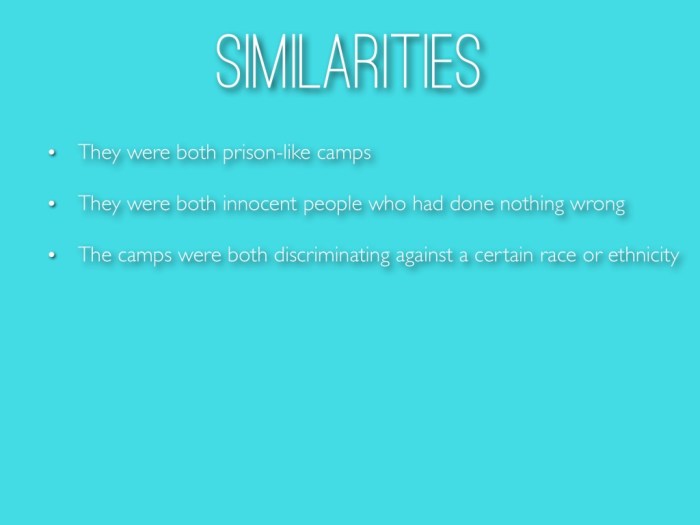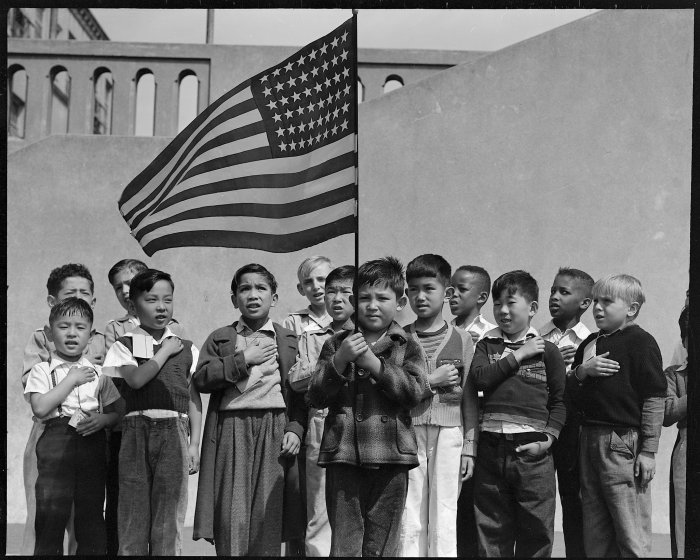Similarities between the Holocaust and the Japanese internment offer a sobering glimpse into the dark recesses of human history, revealing the harrowing consequences of prejudice and discrimination. This exploration delves into the historical context, motivations, treatment of individuals, and government involvement in these tragic events, drawing comparisons to highlight their chilling similarities.
From the Nazi regime’s systematic persecution of Jews to the United States’ forced relocation of Japanese Americans, these atrocities share a common thread of dehumanization and suffering.
Historical Context

The Holocaust:
The Holocaust was a systematic, state-sponsored genocide carried out by Nazi Germany against the Jewish population of Europe. It occurred between 1941 and 1945, resulting in the deaths of an estimated 6 million Jews.
The Japanese Internment:
The Japanese internment was the forced relocation and incarceration of Japanese Americans and Japanese immigrants in the United States during World War II. It occurred between 1942 and 1945, with approximately 120,000 people detained in internment camps.
Reasons and Motivations
The Holocaust:
- Nazi ideology of racial superiority and anti-Semitism
- German nationalism and expansionism
- Economic and social tensions
The Japanese Internment:
- Wartime fear and suspicion of Japanese Americans
- Racism and xenophobia
- Executive Order 9066, signed by President Franklin D. Roosevelt
Treatment of Individuals
The Holocaust:
- Confinement in concentration and extermination camps
- Forced labor, starvation, and medical experiments
- Systematic murder in gas chambers and mass shootings
The Japanese Internment:
- Confinement in internment camps, often in harsh conditions
- Loss of property, jobs, and education
- Psychological trauma and social stigma
Government Involvement

The Holocaust:
- Nazi regime actively planned and executed the Holocaust
- German authorities collaborated in the persecution and extermination of Jews
- International community largely remained silent
The Japanese Internment:
- U.S. government authorized and implemented the internment
- Federal and state agencies enforced the policy
- Supreme Court upheld the internment in Korematsu v. United States
Impact on Victims: Similarities Between The Holocaust And The Japanese Internment

The Holocaust:
- Physical and psychological trauma
- Loss of family, friends, and communities
- Long-term effects on survivors and their descendants
The Japanese Internment:
- Loss of property, jobs, and education
- Psychological trauma and social stigma
- Long-term effects on interned individuals and their families
FAQ Resource
Were the motivations behind the Holocaust and Japanese internment similar?
Yes, both were driven by deep-seated prejudices, fear, and a desire to maintain social and political control.
How did the treatment of individuals in the Holocaust differ from that in the Japanese internment?
While both involved confinement and forced labor, the Holocaust was characterized by systematic extermination, while the Japanese internment primarily focused on detention and relocation.
What are the key lessons to be learned from these tragic events?
They underscore the importance of vigilance against discrimination, the protection of human rights, and the need to confront and overcome prejudice in all its forms.